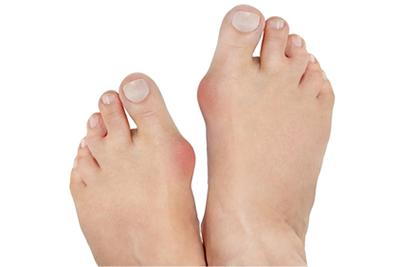The Connection Between Bunions and Genetics

- posted: Sep. 18, 2024
Bunions are foot deformities that change the shape of the feet and the position of the toes. Doctors and experts believe that, in some cases, bunions have a tie to a patient’s genetic profile. If you have an older family member who has bunions, learn more about the connection between bunions and genetics when you talk to Dr. James Hurst at Centreville Foot & Ankle & Sports Medicine in Centreville, VA.
How Do Bunions Form?
When you squeeze your feet into a pair of high heels or shoes with a very narrow toe box in the front and walk for long periods, you increase the chance of developing bunions. They are bony protrusions from the inner sides of the feet caused by the metatarsophalangeal (MTP) joint, also called the “big toe joint.” With pressure, time, and force, the joint moves out of alignment and causes the bump to form. At the same time, the big toe and other toes begin to crowd each other and overlap.
Bunions: A Genetic Condition
While bunions may not be directly associated with genetics, other inherited conditions can make a patient more likely to develop them. For instance, people with arthritis may be more prone to problems with bunions because the cartilage in their joints becomes weak and deteriorates without proper care. Arthritis is a condition that may be genetically inherited. Patients who have fallen arches or “flat feet” are also more likely to develop bunions, and that is a foot problem that can run in families. The way the foot is structured overall is caused by genetics.
Can Bunions Be Treated When They Are Inherited?
When bunions are inherited, it may mean that the patient has a certain biological profile that makes them more likely to develop them. If that is so, it may be more difficult to fix the bunions and prevent them from forming again in the future. However, even if your bunions are related to a genetic condition or predisposition, your Centreville, VA, doctor can offer you the following treatment options:
- Shoe pads and orthotic devices that help encourage better toe alignment.
- Injection therapy to reduce inflammation.
- Bunionectomy surgery to remove the bony bump, adjust the joint, and fix the foot’s structure.
Learn More and Seek Solutions for Your Bunions
Part of maintaining good foot health is ensuring that your feet retain their natural shape and alignment. Whether you have a minor or an advanced case of bunions, a podiatrist can help you treat them. Call 703-830-3338 today to schedule a foot exam with Dr. James Hurst at Centreville Foot & Ankle & Sports Medicine in Centreville, VA.

- posted: Sep. 18, 2024
Bunions are foot deformities that change the shape of the feet and the position of the toes. Doctors and experts believe that, in some cases, bunions have a tie to a patient’s genetic profile. If you have an older family member who has bunions, learn more about the connection between bunions and genetics when you talk to Dr. James Hurst at Centreville Foot & Ankle & Sports Medicine in Centreville, VA.
How Do Bunions Form?
When you squeeze your feet into a pair of high heels or shoes with a very narrow toe box in the front and walk for long periods, you increase the chance of developing bunions. They are bony protrusions from the inner sides of the feet caused by the metatarsophalangeal (MTP) joint, also called the “big toe joint.” With pressure, time, and force, the joint moves out of alignment and causes the bump to form. At the same time, the big toe and other toes begin to crowd each other and overlap.
Bunions: A Genetic Condition
While bunions may not be directly associated with genetics, other inherited conditions can make a patient more likely to develop them. For instance, people with arthritis may be more prone to problems with bunions because the cartilage in their joints becomes weak and deteriorates without proper care. Arthritis is a condition that may be genetically inherited. Patients who have fallen arches or “flat feet” are also more likely to develop bunions, and that is a foot problem that can run in families. The way the foot is structured overall is caused by genetics.
Can Bunions Be Treated When They Are Inherited?
When bunions are inherited, it may mean that the patient has a certain biological profile that makes them more likely to develop them. If that is so, it may be more difficult to fix the bunions and prevent them from forming again in the future. However, even if your bunions are related to a genetic condition or predisposition, your Centreville, VA, doctor can offer you the following treatment options:
- Shoe pads and orthotic devices that help encourage better toe alignment.
- Injection therapy to reduce inflammation.
- Bunionectomy surgery to remove the bony bump, adjust the joint, and fix the foot’s structure.
Learn More and Seek Solutions for Your Bunions
Part of maintaining good foot health is ensuring that your feet retain their natural shape and alignment. Whether you have a minor or an advanced case of bunions, a podiatrist can help you treat them. Call 703-830-3338 today to schedule a foot exam with Dr. James Hurst at Centreville Foot & Ankle & Sports Medicine in Centreville, VA.
Main Location
5729 Centre Square Dr,
Centreville, VA 20120
Monday
7:30 am - 4:00 pm
Tuesday
7:30 am - 4:00 pm
Wednesday
7:30 am - 4:00 pm
Thursday
7:30 am - 4:00 pm
Friday
7:30 am - 3:00 pm
Saturday
Closed
Sunday
Closed
